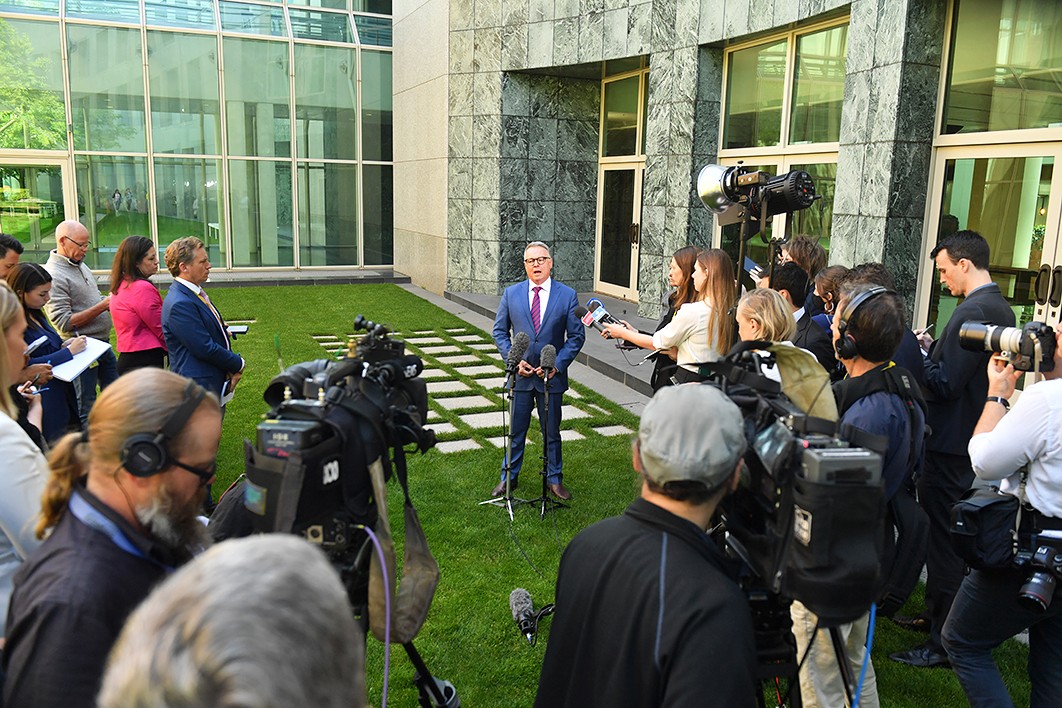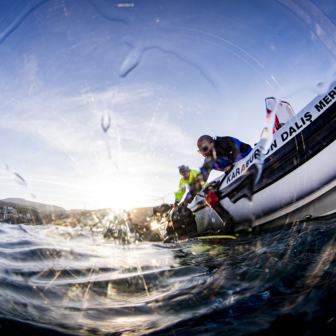Mark Butler and Joel Fitzgibbon both have half a point. Butler, Labor’s environment spokesman, has taken heart from Joe Biden’s victory across the Atlantic, citing it as evidence that “a strong, courageous policy on climate action and jobs can be a central part of a winning election formula in an economy very similar to ours.”
Yes, the US presidential election saw a centre-left candidate win office from opposition with a strong climate policy. But was it “central”? Maybe. Biden managed not to let it get in the way of the voters’ main task, which was to kick out the dreadful incumbent.
That presents a pretty good template for the job of most oppositions in democracies: voters need to be inclined to toss out the government, and the other side gently tills this fertile soil. Nothing too scary; don’t make yourself hard to vote for. Afterwards, the victor gets to tell the tales of conviction and derring-do, of how the battle was fought and won, for journos to internalise and repeat.
An ambitious climate policy was necessary to keep the Democratic ship together, to keep the left wing on board and keen to turn out, but political life would be easier for both the Democrats and our own Labor Party if global warming were not a thing.
In the particular case of Fitzgibbon, who quit as shadow resources minister this week, it’s difficult to determine exactly what he doesn’t like about Labor policy, as there’s little there to speak of. Zero net emissions by 2050? This is why he spat the dummy?
The member for Hunter warned this week against “demonising coal workers.” Okay, that’s good advice — on the off-chance his party’s leadership was considering adopting this strategy. He’s on firmer ground when he says that winning the next election should be prioritised over policy purity, but actually he’s saying more than that. His favoured approach would be little or no action on climate change.
He also reckons that “Labor can’t form a government without winning at least two central-north Queensland electorates… and a couple around the rim of Perth,” which is obviously untrue in any literal sense, given the existence of the other 147 seats. What he means is that you can’t win without miners and mining communities, but that’s not right either. There just aren’t enough of them.
It’s true that people shouldn’t be thrown on the scrapheap in the change to renewable energy. Important policies often produce losers (usually short-term) and winners (often the country as a whole, eventually), and mitigating the plight of the former should be prioritised and hasn’t been sufficiently in the past. That’s not what he’s on about either. He simply doesn’t want to see coal phased out.
But something more fundamental is at play, a fight for the soul of the party. These barneys tend to be heavy on rhetoric and light on facts and figures. Clichés abound. It’s not really about those four mining seats, or any seats. It’s about something otherworldly: about Labor once again being the party of “the worker” rather than “progressives.”
And it’s not really about winning elections, although Fitzgibbon and others pretend it is. The same criticism was levelled at Labor when it was led by Gough Whitlam. The “dregs of the middle class,” as Kim Beazley Snr famously complained a year before the party took office for the first time in twenty-three years. The same criticism was levelled across all five of Bob Hawke and Paul Keating’s consecutive terms. Hawke’s finance minister Peter Walsh was the highest-profile proponent of this friendly fire: the party was selling out the working class for eastern-suburban trendies in Sydney and Melbourne. Sure it was good politics, said Walsh, but it was immoral.
But when Labor is losing elections, the “straying from its original mission” meme can seem to have explanatory power too; cue the banalities about “battlers” and “the base.”
Here’s the deal, as ol’ Joe might put it. Labor hardly ever won federal elections before Whitlam. Success comes from appealing to that largish cohort called Australians, in all their various shapes, sizes and backgrounds. Chasing a particular section of the electorate is a recipe for misfire. Remember 2004, when Mark Latham was going to bring back the outer suburbs — after all, he personified them, didn’t he? On election day those areas led the charge — to the Howard government.
Fitzgibbon’s “blue-collar” voters, depending on how you define them, are a shrinking cohort, still predominantly vote Labor, and any depletion has had a minor effect at the ballot box.
Glorifying the old days when Labor won a big majority of “tradesmen”— as if a salaried plumber in the 1960s is the same thing as a self-employed one with a couple of offsiders today — is pretty pointless as well.
When Fitzgibbon goes to bat for miners on between $150,000 and $200,000 a year (his characterisation) he really gives the game away. Labor was formed to fight for the interests of people on double the median full-time wage to the detriment of those below who would benefit from a growing renewables sector?
One major sleight of hand in all this is the assumption that the last election result was in any non-trivial way due to Labor’s climate policy. Those with memories longer than goldfish might recall it was the opposition’s politically ambitious economic agenda, burdened by franking credits and negative gearing — and with a fictitious “death tax” thrown in — that took centre stage, with global warming a supporting act. (If the opposition had offered a smaller target, climate policy might have attracted more attention.)
Parties trade off policy and politics. This or that might be a great reform, but it’s not something we should take to an election; maybe once we’re in office. When you’re in government you can (or could, under more agreeable Senates) spring change on voters and trust they’ll have forgiven you by the next election. These days, of course, with journalists demanding so much be ruled in or out, it’s more complicated.
Global warming will largely be taken out of Australia’s hands anyway. If the world acts, overseas demand for our minerals will dry up. If we continue to be laggards on the domestic front — insisting on coal-fired power stations, for example — other countries will price the emissions into our exports or even hit us with tariffs. It’ll be a bit like ending White Australia; we were dragged into the second half of the twentieth century by international pressure.
It should also be like cutting tariffs three decades ago: a general bipartisanship with cynical politics restricted to the edges. (Keating boasts about his political courage now, but he was quick to capitalise when the Liberal opposition proposed something more adventurous.) The fact that Australian action can’t directly deal with the climate problem within our borders facilitates a level of irresponsibility. It doesn’t help that powerful sections of the Coalition, inside and outside parliament, encouraged by News Corp, are off with the denialist fairies.
For the next election Labor should, like Biden, promise enough to make clear it’s the only party serious about climate change but that it also remains a safe option to vote for. Identifying that sweet spot is the hard part. •





